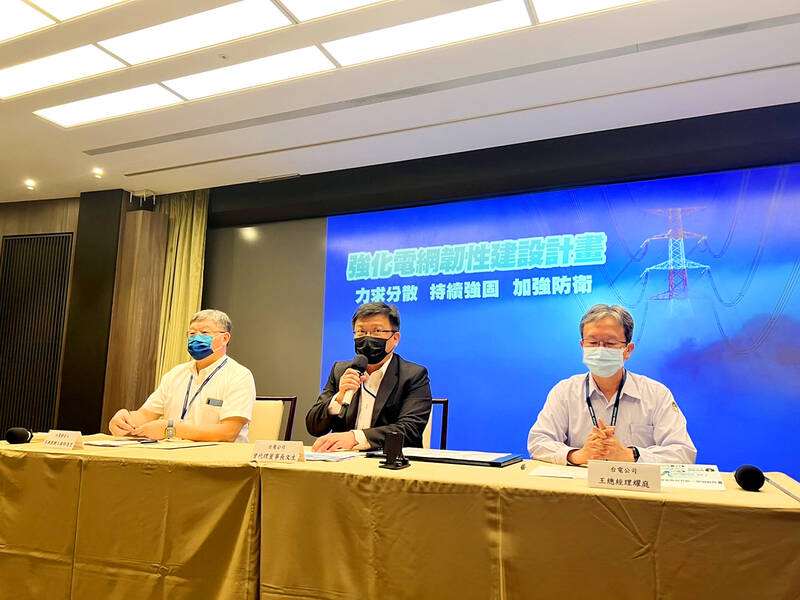Taiwan Power Co (Taipower, 台電) yesterday unveiled plans to invest NT$564.5 billion (US$18.13 billion) over the next 10 years to enhance the resilience and reliability of its power grids, in a bid to prevent massive outages from affecting industrial production and people’s lives.
The power grid enhancement plan, the largest in the company’s history, came amid growing concern about the state utility’s ability to maintain stable electricity supply after a large-scale blackout in March affected 5.49 million households and halted the operations of semiconductor, cement and petrochemical plants, mostly in Kaohsiung and adjacent areas.
That is aside from the frequent and smaller power interruptions that struck households, stores and factories over the past one to two years due to equipment malfunction or human error.

Photo: Ching Lin, Taipei Times
“The new project aims to enhance power grid resilience by deploying microgrids, rather than relying on major grids for electricity supply,” Taipower acting chairman Tseng Wen-sheng (曾文生) told a media briefing.
The multiple dispersed power generation sources and transmission channels would reduce the frequencies of major blackouts as the damage can be better controlled within a region, Taipower president Wang Yao-ting (王耀庭) said.
The large-scale outage in March was an example. The blackout was caused by a switch malfunction at Kaohsiung’s Hsinta Power Plant (興達電廠), which took the facility offline and led to a circuit malfunction at the Longqi Extra High Voltage Substation (龍崎超高壓變電所), causing several power plants in the south to shut down.
To prevent such ripple effects, Taipower plans to reduce interregional power supply by adjusting power allocation and deploying dedicated microgrids to transmit power directly to industrial users in major science parks, Wang said.
Taipower plans to transmit electricity to industrial users in the Hsinchu Science Park from the Tunghsiao Power Plant (通霄電廠) in Miaoli County, while the Taichung Power Plant (台中電廠) would serve users in the Central Taiwan Science Park.
The Hsinta Power Plant will supply power to companies in the Southeastern Taiwan Science Park, while the Datan Power Plant (大潭電廠) will be responsible for users in Taoyuan and New Taipei City industrial parks, the company said.
Those regional grids would also provide a pathway to switch to renewable energy, such as wind and solar power, Wang said.
To provide stable power supply, Taipower plans to add about 52 new and revamped substations, mostly indoor facilities within the next 10 years.
The company plans to upgrade substations and power transmission systems more regularly to boost their reliability, its said.
The Cabinet has approved a capital injection of NT$150 billion for Taipower next year to fund the project, Tseng said.

Vincent Wei led fellow Singaporean farmers around an empty Malaysian plot, laying out plans for a greenhouse and rows of leafy vegetables. What he pitched was not just space for crops, but a lifeline for growers struggling to make ends meet in a city-state with high prices and little vacant land. The future agriculture hub is part of a joint special economic zone launched last year by the two neighbors, expected to cost US$123 million and produce 10,000 tonnes of fresh produce annually. It is attracting Singaporean farmers with promises of cheaper land, labor and energy just over the border.

US actor Matthew McConaughey has filed recordings of his image and voice with US patent authorities to protect them from unauthorized usage by artificial intelligence (AI) platforms, a representative said earlier this week. Several video clips and audio recordings were registered by the commercial arm of the Just Keep Livin’ Foundation, a non-profit created by the Oscar-winning actor and his wife, Camila, according to the US Patent and Trademark Office database. Many artists are increasingly concerned about the uncontrolled use of their image via generative AI since the rollout of ChatGPT and other AI-powered tools. Several US states have adopted

KEEPING UP: The acquisition of a cleanroom in Taiwan would enable Micron to increase production in a market where demand continues to outpace supply, a Micron official said Micron Technology Inc has signed a letter of intent to buy a fabrication site in Taiwan from Powerchip Semiconductor Manufacturing Corp (力積電) for US$1.8 billion to expand its production of memory chips. Micron would take control of the P5 site in Miaoli County’s Tongluo Township (銅鑼) and plans to ramp up DRAM production in phases after the transaction closes in the second quarter, the company said in a statement on Saturday. The acquisition includes an existing 12 inch fab cleanroom of 27,871m2 and would further position Micron to address growing global demand for memory solutions, the company said. Micron expects the transaction to

A proposed billionaires’ tax in California has ignited a political uproar in Silicon Valley, with tech titans threatening to leave the state while California Governor Gavin Newsom of the Democratic Party maneuvers to defeat a levy that he fears would lead to an exodus of wealth. A technology mecca, California has more billionaires than any other US state — a few hundred, by some estimates. About half its personal income tax revenue, a financial backbone in the nearly US$350 billion budget, comes from the top 1 percent of earners. A large healthcare union is attempting to place a proposal before